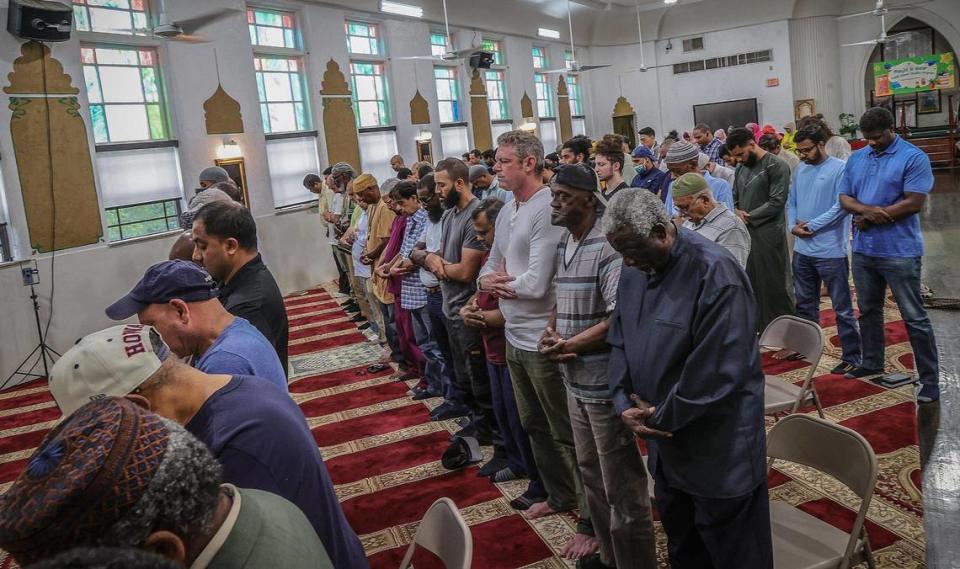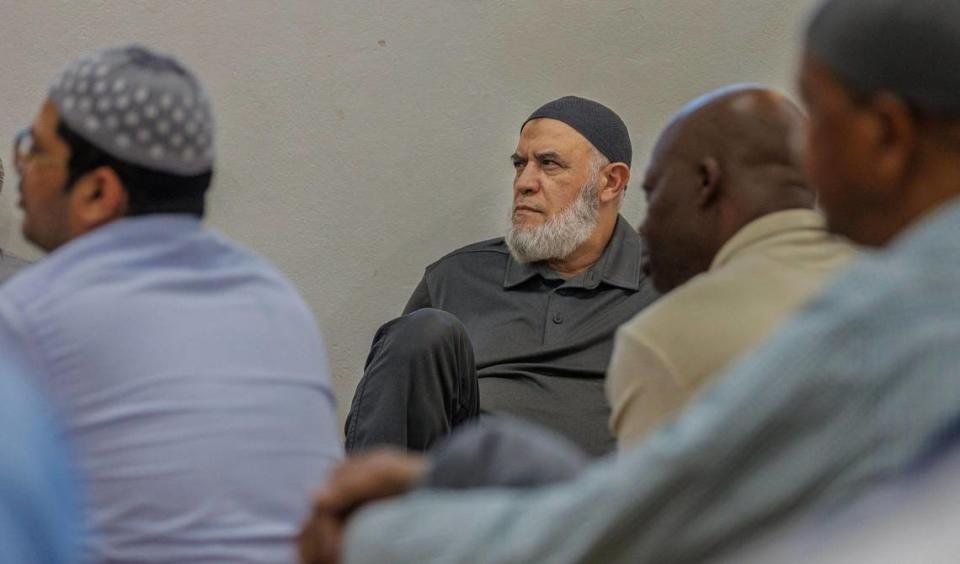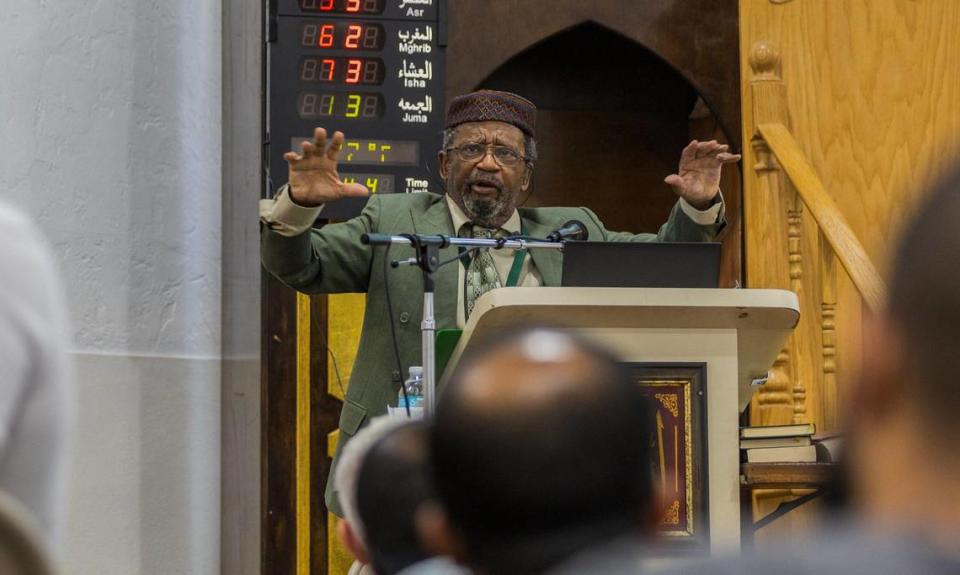As the holy month of Ramadan begins, Gaza is on the mind of many South Florida Muslims
For Muslims around the world, Ramadan is not only the holiest month of the year, but a joyous time for spiritual growth, self-restraint and family gatherings. But this year, with the war between Israel and Hamas raging on, Muslims in South Florida also are turning their eyes toward Gaza.
“Right now, everybody in the Muslim community has Gaza on their mind,” said Tehsin Siddiqui, president of the Coalition of South Florida Muslim Organizations (COSMOS). “This conflict affects us right here in South Florida. There are people in the community who have lost multiple members of their community, their families.”
The heightened emotions have prompted at least some mosques to take extra security steps, including opting out of open houses hosted during past holidays.
As Muslims prepare for a month of fasting and prayer that begins in South Florida at sundown on Sunday, some mosques and Islamic organizations also are banding together to raise money for relief efforts in Gaza, where a quarter of the 2.3 million Palestinians who live there face starvation and some 80 percent have been displaced, according to the United Nations. After a surprise attack by Hamas five months ago that left some 1,200 dead and 240 people taken hostage, Israel’s counterattack has killed an estimated 30,000-plus in Gaza, according to Palestinian health officials.
“They’re praying for a ceasefire, a lasting ceasefire,” said Siddiqui referring to Muslim Americans. “And praying for all the refugees that are in God knows how many stages and places.”

Fasting to feel empathy
During the holy month, Muslims typically refrain from eating and drinking from sunrise to sunset. Fasting, which is one of the five pillars of Islam, is a vital part of Ramadan, the holy period that marks the month when Muslims believe the angel Gabriel first revealed the Quran, Islam’s central religious text, to the Prophet Muhammad.
“It’s not just about refraining from food and water, but it’s also refraining from all the bad habits that one may have in their normal everyday life,” said Professor Mohamed Ghumrawi, assistant director of the Jaffer Center for Muslim World Studies at Florida International University. “It’s meant to sort of bring you back to balance. And so much of it is a very spiritual journey.”
One of the reasons why Muslims fast during Ramadan is to remember those who are oppressed or suffering, and to share in those emotions.
“There’s an overall mood this Ramadan where hearts are very heavy,” said Ghumrawi. “We have the privilege of knowing that at the end of the day, we get to have a meal. But our brothers and sisters in Gaza, they don’t know if they’re going to have a meal at the end of their day.”
At sundown, many Muslims break their fast at a community mosque by holding a celebratory meal called an “Iftar” dinner, followed by nighttime prayers that can go until late in the evening.
Normally, mosques will hold open houses throughout the month of Ramadan, inviting non-Muslim friends and community members to share the Iftar meal. Ghumrawi said the practice has been around for decades to bring more visibility to the month of fasting that Muslims partake in every year and build unity between different groups.
Security precautions
But this year, in lieu of the open houses, COSMOS and its partners have decided to support a larger Iftar dinner in Fort Lauderdale to raise funds and awareness about conditions in Gaza. Similar events, hosted by Islamic Relief USA, are also being held in Tampa and Orlando.
“We’re going to raise funds for the innocent children and women especially who are suffering and have no food, no water,” said Naveed Anjum of the Islamic School of Miami, which is supporting the effort. “How can we have all that food to eat ourselves with our children and family when we know families in Gaza, in Ramallah, in Palestine, have nothing.”
The decision to forego the open houses was made out of security concerns as well as a desire to take action for Palestinians, said COSMOS president Siddiqui.
At open houses, “we don’t really have control over who’s coming and who’s not from the South Florida community,” Siddiqui said.
The decision comes at the same time where tensions between religious groups are high in South Florida. In January, a Muslim conference organized by the South Florida Muslim Federation was canceled after an online campaign labeled the group “Hamas sympathizers” and a petition signed by over 4,000 people pressured the hotel to cancel. Hamas, which governs the Gaza Strip and is one of the Palestinian territory’s major political parties, has been labeled a terrorist group by the U.S. and many other Western countries.
Conference organizers called the campaign “dehumanizing” and ultimately rescheduled the conference for February.
“Wanting freedom for Palestinians doesn’t make you a terrorist — it makes you human,” wrote Samir Kakli, president of the South Florida Muslim Federation in an op-ed for the Miami Herald. “Weaponizing words like ‘terrorist’ or ‘Hamas’ against the Muslim community is no different than using any other racist trope targeting other communities.”

Last week at an annual community dinner organized by COSMOS, some Jewish friends and partners who typically attend did not show up, according to Siddiqui and other COSMOS leaders. The reasons were unknown, but the situation added to the feelings of division in South Florida among groups that have spent years fostering positive relationships.
“I think both parties, when I say both parties is probably the Muslim community and Jewish community, are not ready to sit down and talk about this at this point,” she said.
Still, many individual mosques in across Florida will continue to host the open houses as usual, according to a list on the South Florida Muslim Federation website.
And some within the Muslim community are using the month of Ramadan to take a more political stance on the war. Last month the Council on American-Islamic Relations (CAIR) encouraged Muslim leaders and organizations to reject invitations to Ramadan events “held by officials who support the genocide in Gaza.”
“We encourage mosque and Islamic center to question relevant officials, especially members of Congress, about their stance on the genocide and educate them about the crisis,” said CAIR National Executive Director Nihad Awad in a statement.
‘Bad people everywhere’
Some mosques have requested extra police officers to monitor the property and in some cases in the past, officers have even stayed overnight to accommodate late night prayers.
Anjum said the Islamic School of Miami has already spoken with Miami-Dade law enforcement to arrange security during Ramadan, and that the department has always been cooperative in the past.
The Islamic school, which sits on over four acres of land in the Hammocks community in west Kendall, has faced serious attacks in the past including an incident in 2015 where an individual vandalized signs and gates and left threatening items, including a ceramic skull and books on ISIS on the property. Prior to that, there was an incident where the mosque was riddled with bullets and had its windows smashed in.
“The history is very evident ... there are bad people everywhere,” said Anjum, who’s the vice-chairperson on the board of directors at ISOM. “We don’t have any direct threats from our brothers and sisters in Abrahamic faith, but some demented-minded people can do anything wrong. And we were subjected to some of these hate crimes in the past.”
Islamophobic and anti-Palestinian incidents have been rising at an alarming rate since Oct. 7, according to data from CAIR, which tracks Islamophobic incidents. In October, a Palestinian American boy was stabbed to death in his apartment and his mother severely wounded. The incident is being investigated by the Justice Department as a hate crime. On Florida college campuses, student attempts to speak out for Palestinian rights — including calls for a ceasefire between Israel and Hamas — have been met with Islamophobia and obscenities in some instances, students say.
“The current political situation is very tense right now, not only in South Florida, but throughout the entire country. There’s increased antisemitism, there’s increased Islamophobia,” said Ghumrawi.
‘Food for the soul’
At Masjid Al-Ansar on the Friday before Ramadan, Imam Nasir Ahmed spoke candidly about what he views as a world that has lost its way by straying from Islamic traditions. He shared conservative teachings about homosexuality and abortion while speaking about the Quran’s emphasis on equality.
“Here in America, in my time, I saw racism to the hugest extent ... the same way, you see the Israelis attacking the Palestinians I felt that in United States, I lived through that.”
Ahmed also criticized Zionism in his service. “No nation will every run the entire world,” he said. “Allah will not share world power with anybody.”

After the fiery service at the Liberty City mosque, Ahmed sat down with some members to discuss the importance of Ramadan in Islam and the benefits of fasting.
“At the end of the month, you should have self-mastery. That’s the goal,” Ahmed said. “Because for most human beings, they have been knocked off the throne in themselves.”
Member Tariq Asad described fasting as a personal transformation, a way to withhold oneself from physical desires to make room for spiritual development.
“We’re working on developing the soul and feeding the soul. Food for the body is eating and drinking, food for the soul is prayer, contemplating on God, being kind,” Asad said. “The joyous part of it is when the soul is inspired by these things. Because you feel different.”
After weeks of daily fasting and self-discipline, Ramadan will conclude with a final celebration called Eid al-Fitr, to mark the end of the holy month. The holiday, which falls this year on April 10, is recognized as a holiday for students for the first time in Miami-Dade County this year. Broward and Palm Beach County school districts recognized the holiday in 2021.
This story was produced with financial support from Trish and Dan Bell and from donors comprising the South Florida Jewish and Muslim Communities, in partnership with Journalism Funding Partners. The Miami Herald maintains full editorial control of this work.

